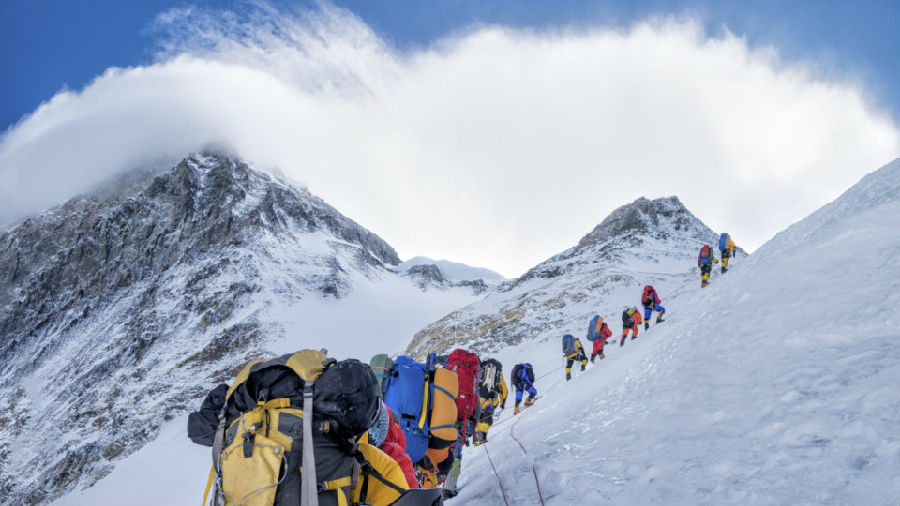為何越來越多人熱衷于登頂珠峰?
We humans like to conquer.
人類喜歡征服的感覺。
For the same reason that soccer players want to hold the World Cup trophy and tennis players crave a Grand Slam win, mountaineers dream of reaching the highest peak on the planet – Mount Qomolangma, which towers about 8,844 meters above sea level.
就像足球運(yùn)動(dòng)員想要捧起大力神杯,網(wǎng)球運(yùn)動(dòng)員渴望獲得大滿貫一樣,登山者們夢(mèng)想著登頂這個(gè)星球的最高峰 —— 海拔約8844米的珠穆朗瑪峰。
"Everybody wants to stand on top of the world," Mirza Ali from Pakistan who had just "conquered" Mount Qomolangma, told the Los Angeles Times.
“每個(gè)人都想站在世界之巔,”來自巴基斯坦的米爾扎·阿里剛剛“征服了”珠穆朗瑪峰,他在接受《洛杉磯時(shí)報(bào)》采訪時(shí)如此表示。
However, this desire to conquer has become so strong that we have begun to travel in the wrong direction.
然而,這種強(qiáng)烈的征服欲也會(huì)讓我們走上歧途。
During this year's climbing season – from March to May – at least 11 climbers died in the Himalayas, making it one of the worst seasons on record. And the fact that many of the climbers were inexperienced is one of the major factors contributing to the tragedy, according to USA Today.
在今年3月至5月的登山季期間,至少有11名登山者在喜馬拉雅山脈遇難,今年也因此成為了歷年來最糟糕的登山季之一。據(jù)《今日美國》報(bào)道,許多登山者缺乏經(jīng)驗(yàn)是造成悲劇的一大主要因素。
"They don't train very hard. They underestimate Qomolangma," Jangbu Sherpa, who has been working as a guide on Mount Qomolangma since 2006, told NBC News. "There are lots of climbers who just want to check the box so that they can say they've been to the top of the world."
“他們沒有經(jīng)過嚴(yán)格的訓(xùn)練,低估了珠穆朗瑪峰,”從2006年起便在珠峰擔(dān)任向?qū)У膿P(yáng)布·夏爾巴在接受(美國)全國廣播公司新聞網(wǎng)采訪時(shí)表示。“有不少登山者只是想來打個(gè)卡,這樣他們就能說曾到過世界之巔了。”

This ignorant attitude of climbers also leads to other problems – apart from putting their own lives at risk, of course. According to HuffPost, the mountain's cleaning group collected 12 tons of trash – including food wrappers, and oxygen tanks – left behind this climbing season. This once holy and peaceful corner of the world has, as The Atlantic reporter Margret Grebowics put it, "lost its magic".
除了將自己的生命置于危險(xiǎn)境地,登山者們的無視態(tài)度也帶來了其他問題。據(jù)《赫芬頓郵報(bào)》報(bào)道,在今年的登山季期間,珠峰清潔隊(duì)在山上清理出了12噸垃圾,包括食品包裝袋以及氧氣罐等。正如《大西洋月刊》記者瑪格麗特·格雷博維奇所言,這處曾經(jīng)神圣又平靜的世界一隅,已經(jīng)“失去了它的魔力”。
Perhaps what we should do now is restore meaning to the activity itself – real meaning. And for Alison Levine, a US mountaineer who reached the summit of Mount Qomolangma in 2010, the meaning doesn't come with the summit itself, but with everything that led her up to it.
或許我們現(xiàn)在應(yīng)該做的,便是還原活動(dòng)本身的真實(shí)意義。對(duì)于曾在2010年登頂珠峰的美國登山者艾莉森·萊文而言,這件事的意義并不在于登頂本身,而在于引領(lǐng)她向上的一切。
"When I did make it to the summit, what I realized is that standing on top of a mountain doesn't change you and doesn't change the world," Levine told the NPR. "It's really about the journey. The journey is the most important thing on any mountain."
“當(dāng)我登頂成功時(shí),我意識(shí)到立于山巔并不會(huì)改變你,或者改變這個(gè)世界,”萊文在接受美國國家公共電臺(tái)采訪時(shí)表示。“這的確是一段旅程。這段旅程才是登山最重要的事。”
It's true that we humans like to conquer. But the first step of conquering anything is probably to learn to conquer our own greed and ignorance.
的確,人類喜歡征服的感覺。但或許征服任何事物的前提是,先學(xué)著征服我們自身的貪婪與無知。












